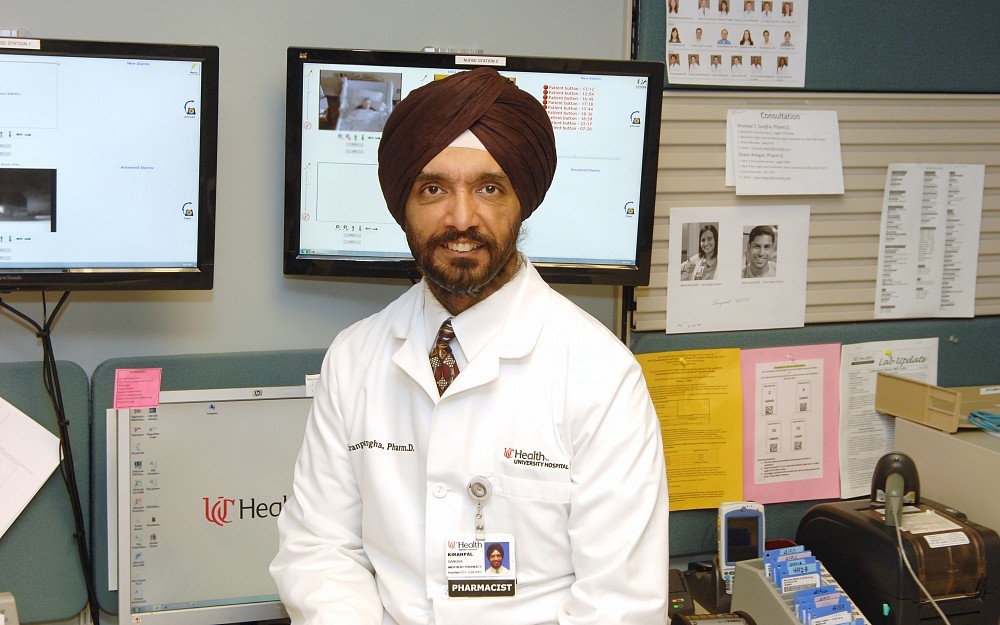
UCMC Training Ground for Clinical Pharmacists
"Straight up fantastic!
Its quite the rave review of a pharmacy practice site, and it comes from those in the know: Tyler Vest, a fourth-year UC pharmacy student finishing up a clinical pharmacy rotation in trauma service at University of Cincinnati Medical Center (UCMC).
"One of the best things about UCs Academic Health Center is that we have a place like UCMC literally right next door to our college, Vest continues, describing how all of the critical care rotations at the hospital, a Level I trauma center, are highly sought after among pharmacy students.
UCMC is within steps of the college and provides 90 clinical pharmacy rotations, with an additional 75 rotations at outlying UC Health locations. The majority of pharmacy students who rotate at UCMC come from UCs James L. Winkle College of Pharmacy, but UCMC also precepts students from Ohio Northern and Ohio State University.
"We have the longest record with UC because we started as the primary teaching site for all of the health colleges experiential education, says UCMC clinical pharmacist and preceptor Kiranpal Singh Sangha, PharmD.
Pharmacy rotations here began about 50 years ago, he says, and started with general rotations such as medicine, surgery and ambulatory care. The program gradually expanded to include specialty areas such as neurocritical care which Sangha formed in 1991,and has 20-25 preceptors who oversee more than a dozen student rotations each month.
Other rotations include: medical intensive care unit, surgical intensive care unit, emergency department, oncology, anticoagulation clinic, psychiatry, cardiology, drug policy development and several others.
"We have very extensive choices here and the preceptors know how to transition you from a little caterpillar to a butterfly, by slowly providing you with the resources and exposing you to the process in a very individualized way, says another very impressed fourth-year pharmacy student, Tara Lines.
"Even as a student, we are a team here and we interact with all of the providers, says Lines, adding that by the end of the rotation "you have a level of independence that is just phenomenal.
Students here, Sangha says, get a "good exposure to institutionally based health care.
"Were not just looking at their doses were looking at their vital signs, their blood sugar, what their physical exam looked like and pertinent positives and negatives relating to the physical exam, says Vest.
The experiential learning program, Sangha says, is set up to provide students with both the knowledge of how a hospital system works and the training to determine whether clinical hospital pharmacy is the career path they see themselves taking.
"A lot of this you dont see until you are with a pharmacist in this environment, so you spend the rotation really deciding, Can I see myself here?says Lines, adding, "You definitely have experiences you wouldnt expect.
For example, she says, a patient who comes in with an unknown bleed who is taking a blood thinner is going to be treated differently from a patient not taking a blood thinner who has a bleed from a car crash.
Vest says: "The Cincinnati and Midwest population is very diverse so you are not seeing one type of patient the spectrum is so broad that even if they have the same injury the treatment may not be even remotely similar.
And sometimes the teacher is the student as well: "I learn something new here every day, adds Sangha.
Tags
Related Stories
Study sheds light on enzyme's role in driving lymphoma growth
June 3, 2025
MSN highlighted a study led by University of Cincinnati Cancer Center researchers that sheds new light on the mechanisms by which a major oncogene promotes and sustains lymphoma development and progression, paving the way for novel targeted therapies.
UC experts lead groundbreaking research and wellness programming...
June 3, 2025
The University of Cincinnati is part of a collaborative national team spearheading research and wellness programming with the goal of improving care for adaptive athletes through the Para-Athlete Research for Wellness, Injury Prevention and Sports Medicine Excellence (PARA-WISE) registry.
Electronic consent demonstrates potential to overcome 'key...
June 2, 2025
NeuroNews highlighted research led by the University of Cincinnati's Iris Davis and the University of Minnesota's Christopher Streib that revealed the potential advantages associated with electronic informed consent in acute ischemic stroke studies, including increased enrollment rates and improved adherence to consent documentation.
